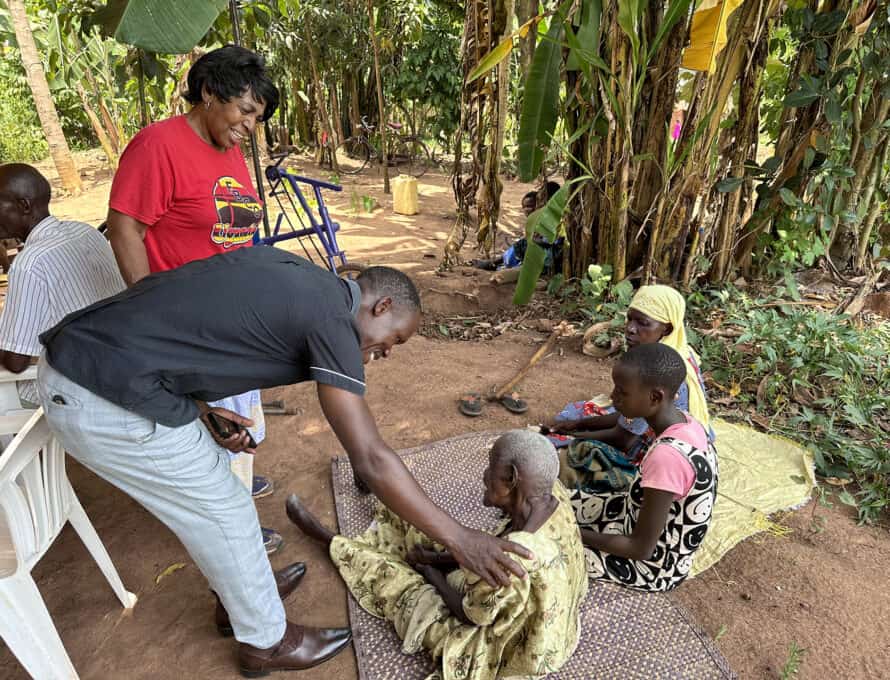by Kristen Sosebee
Sonya Herron stood beneath a small tent among a group of lepers, and others from the village, and shared the gospel with boldness. She called people to walk in the light as Jesus is the Light and challenged them to be fully committed to Christ. Afterward, an older man, missing one leg, came forward on crutches. He declared his allegiance to Christ in front of the entire group and put his faith in Jesus. The man, who suffers from leprosy, is one of almost 50 lepers in the village.
“You don’t hear much about these people, people with leprosy, because they are more hidden, and they are more neglected and forgotten,” Herron said.
Leprosy is endemic in Uganda, and there have been cases reported in 40% of the districts. Leprosy is a chronic, infectious disease that affects the skin, peripheral nerves, upper respiratory tract, and eyes. The disease significantly challenges public health and community well-being.
When Nathan, the night guard at the Herrons’ compound, learned about this community of lepers who had no access to healthcare, he sought the Herrons for help. Sonya and her husband, James, serve as IMB missionaries in Uganda and know Nathan well. Nathan was moved with compassion and knew the Herrons would not pass up an opportunity to show God’s love to a neglected, vulnerable population.
“That was not the area that we initially saw, or we came here to work with,” Herron said, “but if you’re willing, you can always find opportunities to join God where He is at work, and where people have needs that you had not even thought of, and no one else has thought of them.”
Sonya and James moved to Uganda more than a decade ago in pursuit of those shunned by the rest of the world. Their ministry focuses on people who live on the islands of Lake Victoria, one of the largest freshwater lakes in the world. They regularly visit a community of outcasts on one of these islands – people who have no other place to go, lawbreakers, refugees, and others in desperate circumstances. They have no electricity, no running water, and, until the Herrons came, no one who cared about them. But the Herrons have pursued them with the love of Christ.
Helping the lepers became another opportunity to join God at work in pursuit of those routinely ostracized and forgotten by the world. Poverty and hunger have grown in Uganda in recent years, and the Herrons, with help from churches and people in their community, started food distributions to provide for people on the island. When Nathan asked for help for the lepers, they expanded the food distribution to include them, too.
They made their first visit to the leper community when a short-term volunteer team from a church in the U.S. came to work alongside them. It was almost Christmas, and the team brought along gifts of clothes, shoes, food and books. They also provided simple healthcare resources and hosted a time of fellowship, singing and dancing. All who came heard the gospel of love, acceptance, forgiveness and reconciliation.
“We want to be a presence in that community in terms of not just giving things, but actually helping people to understand the gospel,” Herron said.
As more people in the village come to faith, Herron emphasized that discipleship is critical. In Uganda, the gospel is not always clearly expressed or understood, and blending religious beliefs remains a barrier to the truth of Jesus Christ.
Alongside ministry partners from her city, Sonya started a weekly Bible study in the leper community with continued outreach to meet their physical and health needs. Anybody who wants to come is invited. While they focus on reaching people with leprosy, they have found it impossible not to embrace the entire village.
Since Sonya’s involvement, many people in the village have turned from Islam because of what is happening in the leper community. Forgotten and neglected people are discovering their worth and acceptance in Christ.
“We want to try to love them and just see how God can use us to really take His Word to these people,” Herron said. “Nobody thinks about them, but now they have found acceptance and that’s what we want.”

